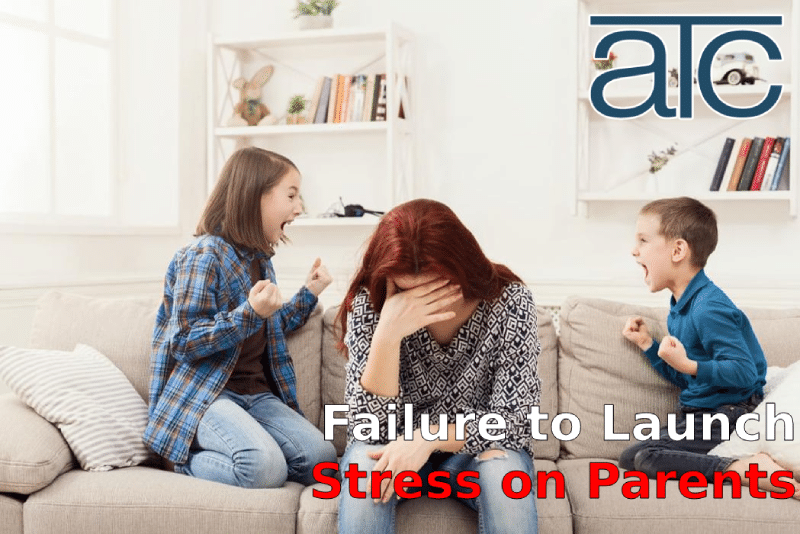Parenting and Failure to Launch
Parenting is hard but when your adult child can’t leave the nest it’s even harder.
Learn how to cope with “failure to launch” as a parent, managing emotions, setting boundaries, and supporting your child’s independence.
This “failure to launch” is more common than you think. Many parents feel stuck and don’t know how to help their kids become independent adults.
Did you know failure to launch can cause mental health problems for both parents and young adults? It’s true. Parents feel guilty, frustrated and alone.
We’ll get to the tips. Ready?
Key Takeaways
- Failure to launch is caused by mental health issues, money problems and over-reliance on parents, so both young adults and parents struggle emotionally.
- Parents feel fear, guilt, frustration and isolation when their adult children can’t become independent which can damage family relationships and mental health.
- Self care, reframe and communication are the keys to parents coping with failure to launch and helping their children move forward.
- Family therapy and professional help can help with communication, coping skills and setting healthy boundaries for both parents and adult children.
- Keep hope, celebrate small wins and connect with other parents in the same boat.

Causes and consequences of Failure to Launch
Failure to launch often comes down to a mix of mental health issues, money problems and over-reliance on parents. Young adults may struggle with anxiety or depression and can’t face the world on their own.
The job market can be tough and some don’t have the cash to move out. Some kids get too comfortable at home and lose the drive to spread their wings.
These obstacles can trap young people in a cycle of dependency. They miss out on life skills and experiences. Parents feel the pressure too. They worry about their child’s future and blame themselves.
The plans for an empty nest disappear and frustration builds. The whole family gets stuck and doesn’t know how to move forward. It’s a tough spot to get out of.
The Emotional Impact on Parents
Parents feel a whirlwind of emotions when their adult kids can’t leave the nest. Shame, worry and anger get mixed together and leave moms and dads feeling lost at sea.
Fear
Fear grips many parents when their adult kids can’t launch. It’s a gut-wrenching worry that keeps them up at night. They worry about their child’s future and if they’ll ever be able to stand on their own two feet.
This fear comes from not knowing how to help or what to do next.
I’ve seen this with my sister. Her 26 year old son still lives at home and can’t hold a job. She’s scared he’ll never be able to make it on his own. The lack of answers or solutions adds to her worry.
It’s like walking in the dark with no flashlight. Many parents feel lost and alone in this situation and don’t know where to turn for help or guidance.
Guilt and Self-Blame
Parents question themselves when their kids struggle to become independent. They ask themselves, “Did I do enough?” or “Was I too soft?” This self-doubt affects their mental health.
While feeling responsible is natural, it’s rarely helpful. Most parents make decisions based on the information they had at the time.
In my practice I’ve seen many parents struggling with these emotions. One dad said, “I should have been more forceful.” A mom said, “I’ve failed my son.” These thoughts stick.
You need to remember that many factors contribute to a young adult’s development. Self-criticism won’t change the past or help your child move forward.
Frustration and Resentment
Parents are stuck between a rock and a hard place. They love their kids but can’t help feeling frustrated when their adult kids won’t leave the nest. This mix of emotions can lead to resentment.
Parents think, “I’ve done everything I can, why won’t they grow up?” These feelings are normal but can corrode family relationships if left unaddressed.
I’ve seen this with my friend Sarah. Her 28 year old son lives at home and shows no signs of moving out. She told me about her growing anger and guilt. “I want to help him, but I’m tired of putting my life on hold,” she said.
This inner conflict is common for parents with failure to launch. You need to address these feelings through open communication, clear boundaries and seeking help if needed.
Isolation
Parents feel alone when their adult kids can’t launch. Friends and family may not get it, so they feel cut off. They stop going out or talking about their problems.
This can make them feel miserable and anxious. It’s hard to find others who get it.
Isolation makes it worse for parents. They don’t know where to turn for help. They might feel ashamed or blame themselves. This can impact their health and relationships.
Parents need to reach out and find support. Talking to others in the same boat can help them feel less alone.
Strategies for Parents of failure to launch children
Parents can take steps to help their adult kids move forward. They can learn new ways to talk and set limits while taking care of themselves.
Reframe the Situation
Reframing the situation can help parents cope with their child’s difficulty transitioning to independence. It’s easy to feel stuck, but changing your view can open new doors. Try to see this time as a chance for growth, both for you and your child.
Instead of focusing on what’s not happening, look at what is. Maybe your child is learning important life skills or exploring their passions. This shift in thinking can ease stress and create a more positive home environment.
I’ve observed how reframing can make a big difference. A friend’s son struggled to find his path after college. At first, she felt frustrated and worried. But when she started to see this time as a period of self-discovery, things improved.
She focused on supporting his interests and helping him build skills. This new outlook helped reduce tension and led to better talks between them. Every journey is unique, and progress often comes in small steps.
Self-Care
Parents need to take care of themselves too. It’s easy to forget about your own needs when you’re worried about your child. But self-care is key. Take time each day to do something you enjoy.
Go for a walk, read a book, or call a friend. Eating well and getting enough sleep matter too. These small acts can help you feel better and cope with stress.
I learned this the hard way when my son struggled to launch. I was so focused on him that I ignored my own health. I felt drained and hopeless. Then a friend suggested I join a yoga class.
At first, I felt guilty taking time for myself. But that hour of peace each week made a big difference. I had more energy to help my son and face each day. Self-care isn’t selfish – it’s necessary.
Effective Communication
Communicating openly with your adult child can be challenging. It’s essential to helping them progress. Begin by listening without judgment. Attempt to understand their fears and struggles.
Then, share your own feelings calmly. Use “I” statements to express your concerns. For example, say “I worry about your future” instead of “You’re wasting your life.” Establish clear, fair rules for living at home.
These might include job hunting or helping with chores. Praise small wins to boost their confidence. Change takes time. Stay patient and keep the lines of communication open.
Effective communication goes both ways. Ask your child what they need from you. Maybe it’s space, or maybe it’s more support. Be prepared to hear difficult truths. Your child might share feelings that are hard to hear.
Stay calm and thank them for being honest. Work together to find solutions. This collaborative approach can help your child feel more in control of their life. It also shows them you’re on their side, even when things are challenging.
The Role of Therapy and Professional Guidance
Therapy and professional guidance play a key role in helping families deal with failure to launch. Family counseling can help parents and kids talk better and fix problems. A therapist can teach ways to handle stress and change family habits.
They may suggest new rules or chores to build independence. Online support groups let parents share tips and feel less alone. For the young adult, individual therapy can boost confidence and teach life skills.
Cognitive behavioral therapy works well to change negative thoughts. A recent post noted that mental illness is twice as likely when siblings don’t get along. So family therapy that includes all kids can be very helpful.
Parents can also benefit from their own counseling to process feelings of guilt or frustration.
I’ve seen firsthand how therapy can turn things around. One family I worked with was stuck in a cycle of anger and blame. Through weekly sessions, they learned to listen and support each other.
The parents set clear expectations, while showing more empathy. Their son started taking small steps toward independence, like doing his own laundry. It wasn’t easy, but with time and effort, the whole family dynamic shifted.
Professional help gave them the tools to move forward together.
Emotional Resilience and Self-Reflection for Parents
Parents require resilience to manage a child who struggles to become independent. It’s challenging, but you can develop strength. Reflect on your emotions. Consider why you might feel angry, sorrowful, or anxious.
Perhaps your expectations for your child or yourself are unrealistic. Release those ideals. Concentrate on the present reality. Connect with other parents who understand. They’ve experienced similar situations.
You’re not isolated in this experience.
Self-care is essential – not selfish. Allocate time for relaxation and rejuvenation. Engage in activities you find enjoyable. Exercise, read, or socialize with friends. A refreshed mindset facilitates better decision-making.
It also demonstrates to your child how to prioritize self-care. Keep in mind that you can’t provide support from depleted resources. Attend to your needs first, then assist your child.
With time and effort, both of you can progress.
Finding Hope and Balance
Hope persists even in challenging times. Parents can achieve balance by concentrating on small victories. Celebrate your child’s progress, no matter how minor. It’s acceptable to feel frustrated, but don’t allow it to dominate.
Take care of yourself as well. Go for walks, meet friends, or try a new hobby. This helps you maintain strength for your family.
Maintaining hope involves considering the broader perspective. Your child’s journey may not be linear, but that’s typical. Many young adults face difficulties in becoming independent.
This doesn’t indicate failure as a parent. Be patient and maintain open communication. With time and support, most children find their path. You’re not alone in this experience. Connect with other parents or join a support group.
Sharing experiences can boost your morale and provide fresh insights.

Frequently Asked Questions
-
1. What is failure to launch, and how does it affect parents?Failure to launch happens when young adults struggle to become independent. It's like a bird that can't fly from the nest. Parents often feel anxious and sad. They worry about their child's future and may blame themselves.
-
How can parents help their adult children who are struggling to launch?Parents can offer emotional support without enabling. Set clear boundaries and expectations. Encourage therapy or life coaching. Help build social skills and coping mechanisms. Remember, it's a team effort. Don't carry the weight alone.
-
What mental health issues might contribute to failure to launch?Many factors can play a role. ADHD, autism, or learning differences might make things harder. Depression, anxiety, or substance abuse could be culprits too. Sometimes, it's a mix of things. Getting the right help is key.
-
How can parents take care of their own mental health during this time?It's not selfish to focus on yourself. Join support groups. Try mindfulness or cognitive-behavioral therapy. Talk to a therapist or family counselor. Remember to breathe. Your mental health matters too.
-
What are some signs that failure to launch is becoming a serious problem?Watch for increased screen time, lack of motivation, or drug use. Procrastination and avoiding responsibilities are red flags. If your child seems stuck in adolescence, it might be time to act. Trust your gut.
-
How can parents motivate their adult children without pushing too hard?Use positive reinforcement, not criticism. Set small, achievable goals. Celebrate wins, no matter how tiny. Encourage personal growth and autonomy. Be patient. Change takes time. Remember, you're their cheerleader, not their drill sergeant.

Recent Comments